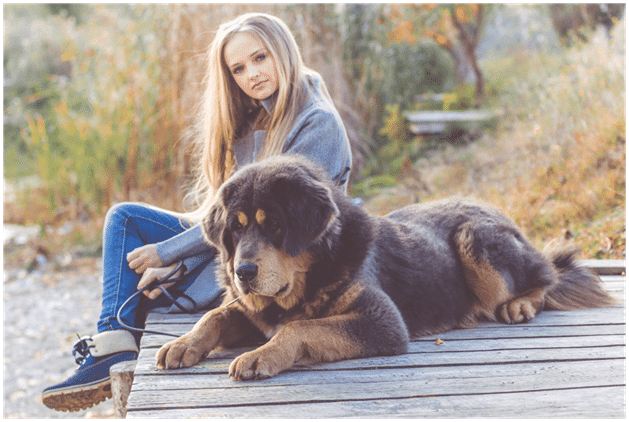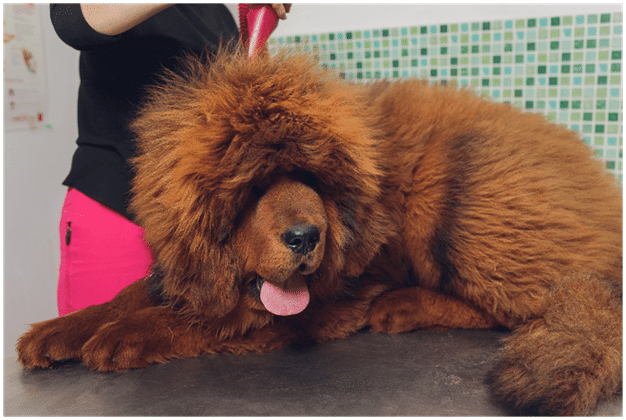Tibetan Mastiffs are a majestic breed known for their thick coat, but do they shed and are they hypoallergenic? In this article, we will explore whether Tibetan Mastiffs are suitable for people with allergies.
Tibetan Mastiffs are not hypoallergenic and only shed once to twice each year. As they have thick coats, they need regular weekly brushing and require a gentle shampoo and conditioner to keep their coats in good condition.
We explore the typical needs of hypoallergenic dogs, along with providing helpful tips for allergy sufferers who are considering owning a Tibetan Mastiff.
Why are Dogs Hypoallergenic?
There are many reasons why dogs may be hypoallergenic. One reason is that they do not have the same type of fur as other animals.
Another reason is that they do not produce the same type of dander as other animals.
Dander is a type of skin flake that contains allergens. Allergens are substances that can cause an allergic reaction in some people.
Do Tibetan Mastiffs Produce Dander?
No, the Tibetan Mastiff breed does not produce dander. This is one of the reasons why they are often considered to be hypoallergenic dogs.
Why don’t hypoallergenic Dogs Shed?
One of the many benefits of owning a hypoallergenic dog is that they typically don’t shed.
This means that less fur will be flying around your house and landing all over your furniture and clothes. In addition, you won’t have to worry about vacuuming up pet hair every day.
If you or someone in your family is allergic to dogs but you still want to experience the joys of owning one, then a hypoallergenic breed may be the perfect solution.
So why don’t hypoallergenic dogs shed? The answer lies in their heavy coats. Most hypoallergenic breeds have double coats that help to trap air and keep their skin cool in hot weather.
The undercoat is typically a bit denser than the outer coat, and it helps to protect the dog from the elements.
This extra layer of fur also acts as a filter, which helps to trap allergens before they can enter the dog’s system.
As a result, these dogs don’t produce as much dander or saliva, which are the main causes of pet allergies.
If you’re thinking about getting a hypoallergenic dog, be sure to do your research first. Not all breeds are created equal, and some may be better suited for people with allergies than others.
Thankfully, there are many great hypoallergenic breeds to choose from, so you’re sure to find the perfect match for your family.
Do Hypoallergenic Dogs Get Fleas?

Some people may think that hypoallergenic dogs do not get fleas, but this is not the case. Fleas are actually quite common in all dogs, regardless of their coat type.
However, there are some things that you can do to help reduce the chances of your hypoallergenic dog getting fleas.
One of the best ways to help keep your dog flea-free is to keep them on a regular flea prevention medication.
There are a number of different medications available, so be sure to talk to your veterinarian about what is the best option for your dog.
Another thing that you can do is make sure that your dog’s environment is as clean and free of fleas as possible. This means regularly vacuuming and washing their bedding, as well as any areas where they spend a lot of time.
Finally, it’s important to check your dog for fleas on a regular basis and take them to the vet if you suspect they have them. By taking these steps, you can help keep your hypoallergenic dog safe and free of fleas.
Do Hypoallergenic Dogs Help with Allergies?
There is no definitive answer to this question since everyone’s allergies are different and can be triggered by different things.
However, some people with allergies find that they have less severe reactions when they are around hypoallergenic dogs.
This may be because these dogs produce less of the proteins that can trigger allergic reactions.
If you are considering getting a dog and you have allergies, it is a good idea to spend some time with different breeds of hypoallergenic dogs to see if one of them works well for you.
Do Hypoallergenic Dogs Need Special Shampoo?
Many people find that using a hypoallergenic shampoo on their dog can help to reduce the amount of allergens that are released into the air.
If you are worried about your dog’s allergies, it is a good idea to speak to your veterinarian about the best shampoo for your pup.
There are a number of different hypoallergenic shampoos on the market, and each one is designed to work best with a certain type of dog.
Some people believe that all dogs need special shampoo, but this is not always the case.
If your dog does not have a history of health issues or allergies, then you can probably use a standard shampoo on them without any problems.
However, if you are unsure about what type of shampoo is best for your dog, it is always better to err on the side of caution and use a hypoallergenic variety.
This will help to ensure that your pup stays healthy and free of allergens.
What Type of Shampoo Does a Tibetan Mastiff Need?

A Tibetan Mastiff needs a shampoo that will help to clean their coat and get rid of any dirt or dried-on mud.
The shampoo should also be gentle enough not to cause any irritation or skin problems for the dog.
There are many different types of shampoos available on the market, so it’s important to choose one that is specifically designed for dogs with thick coats.
You may also want to consider using a conditioner after shampooing to help keep the coat soft and manageable.
How Much do Tibetan Mastiffs Shed?
While Tibetan Mastiffs are not hypoallergenic, they are also a breed that doesn’t shed a lot of hair. They only shed once or twice a year,
So, if you’re looking for a dog that doesn’t shed, the Tibetan Mastiff is a good option for prospective owners. However, they do need to be brushed regularly to prevent matting and tangles.
Can a Person with Allergies Own a Tibetan Mastiff?
Many people with allergies own Tibetan Mastiffs without any problems.
If you are unsure whether or not you are allergic to a particular breed of dog, it is best to consult your doctor before bringing one into your home.
If you have a severe allergy, you may want to consider another breed of dog. However, many people with mild allergies to dogs have no problems at all owning a Tibetan Mastiff.
How to Avoid Dog Allergies?
There are a few things you can do to avoid dog allergies.
First, if you know you are allergic to dogs, try to avoid contact with them.
Second, if you must be around dogs, take steps to reduce your exposure, such as showering immediately after being around them and using an air purifier in your home.
Finally, if you have severe allergies, you may need to consult with an allergist and consider immunotherapy, which can help reduce your symptoms.
What are the Best Dogs for People with Allergies?
There are a few breeds of dogs that are considered to be the best for people with allergies. The poodle, the basenji, and the Labradoodle are all known for being low-allergen breeds.
They don’t shed as much as other breeds of dogs, which means that they don’t produce as much dander, the main allergen for people with allergies.
If you’re looking for a dog that doesn’t produce as much dander, these are the breeds to consider.
However, it’s important to keep in mind that no dog is completely hypoallergenic. Some people may still be allergic to these breeds, but they tend to be less problematic for people with allergies.
What are the Worst dogs for People with Allergies?
While Tibetan Mastiffs are not hypoallergenic, there are a number of different breeds that are known to be particularly troublesome for people with allergies.
Some of the most common include poodles, terriers, and retrievers.
These breeds tend to shed a lot, which can trigger allergies and itchy skin in some people. Other breeds that are known to be problematic for allergy sufferers include schnauzers, bulldogs, and boxers.
If you have allergies, it is important to do your research before deciding on a pet dog.
This will help ensure that you select a breed that will be compatible with your health condition.


